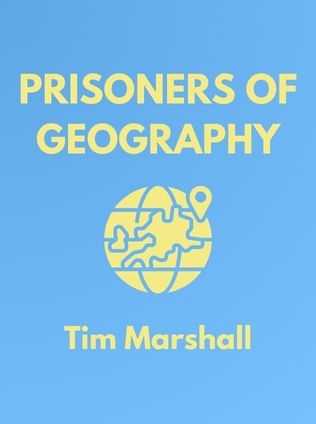
Prisoners of Geography
Ten Maps That Tell You Everything You Need to Know About Global Politics
By Tim Marshall
Published 07/2015
About the Author
Tim Marshall is a seasoned journalist with over 20 years of experience in reporting on global conflicts, international relations, and geopolitical issues. His extensive career includes covering major events such as the wars in the Balkans, Afghanistan, and the Middle East, providing him with a wealth of firsthand knowledge about the forces that shape the world. Beyond his work in journalism, Marshall is also an acclaimed author, known for his ability to translate complex geopolitical concepts into accessible language for general audiences. His books, including "Prisoners of Geography," have been praised for their insightful analysis and engaging narrative style, making him a prominent voice in the field of geopolitics.
Main Idea
"Prisoners of Geography" by Tim Marshall delves into the profound impact that geography has on the development, politics, and international relations of nations. Marshall posits that the physical characteristics of the land—its mountains, rivers, climate, and resources—play a pivotal role in shaping the destiny of countries. By examining the geographical underpinnings of various regions, Marshall reveals how the contours of the earth have influenced historical events, cultural development, and geopolitical strategies. The book argues that while modern technology and globalization have altered some aspects of geopolitical dynamics, geography remains a fundamental factor in determining the course of human history.
Table of Contents
- Introduction: The Power of Geography
- Russia and the Curse of Geography
- China: The Wealth and Power of the Middle Kingdom
- The United States: The Geography of Superpower
- Western Europe: Rivals in a Crowded Place
- Africa: A Continent of Splintered States
- The Middle East: Forever at the Crossroads
- India and Pakistan: The Revenge of Geography
- Korea and Japan: The Imprisonment of Geography
- Latin America: The Legacy of Colonialism
- The Arctic: Tomorrow's Battleground
Introduction: The Power of Geography
Marshall begins his exploration by emphasizing the often-overlooked influence of geography on world events. He asserts that while technology and political decisions are crucial, the physical landscape of a region fundamentally shapes its possibilities and limitations. Geography dictates where cities are built, how trade routes are established, and even where conflicts arise. Marshall writes, "The landscape imprisons leaders, giving them fewer choices and less room to maneuver than you might think." The constraints imposed by geography, according to Marshall, have a significant impact on the development and strategies of nations throughout history.
Russia and the Curse of Geography
Russia's vast landscape is both a blessing and a curse. On one hand, its size provides natural resources and a buffer against invasion. On the other hand, it is difficult to defend and manage such a sprawling territory. Marshall explains that Russia's lack of natural borders, such as mountains or oceans, has historically made it vulnerable to invasions from all directions. This geographic insecurity has led Russian leaders to prioritize the control of surrounding regions as buffer zones, influencing their expansionist policies.
Marshall also highlights the significance of Russia's harsh climate and terrain, which have shaped its economic and military strategies. The long, brutal winters have deterred invaders but also limited Russia's agricultural productivity, forcing it to rely on resource extraction and heavy industry. This focus on resources has made Russia heavily dependent on energy exports, which in turn affects its foreign policy.
- Russia's annexation of Crimea in 2014 was driven by the strategic need for a warm-water port, something its geography lacks.
- The vastness of the Russian steppes has historically acted as both a defensive asset and a logistical nightmare during wartime.
China: The Wealth and Power of the Middle Kingdom
China's geography has contributed to its position as a dominant regional power. Surrounded by natural barriers like the Himalayas, the Gobi Desert, and vast oceans, China has been relatively insulated from invasions, allowing it to focus on internal development and consolidation. Marshall notes that China's rivers, particularly the Yangtze and the Yellow River, have been crucial in supporting large populations and fostering early agricultural civilizations. These fertile river valleys became the cradle of Chinese civilization, giving rise to its long history of centralized governance and cultural continuity.
Sign up for FREE and get access to 1,400+ books summaries.
You May Also Like
Rich Dad Poor Dad
What the Rich Teach Their Kids About Money - That the Poor and Middle Class Do Not!
By Robert T. KiyosakiFreakonomics
A Rogue Economist Explores the Hidden Side of Everything
By Steven D. Levitt and Stephen J. DubnerI Am Malala
The Story of the Girl Who Stood Up for Education and Was Shot by the Taliban
By Malala YousafzaiFactfulness
Ten Reasons We're Wrong About the World – and Why Things Are Better Than You Think
By Hans Rosling



















